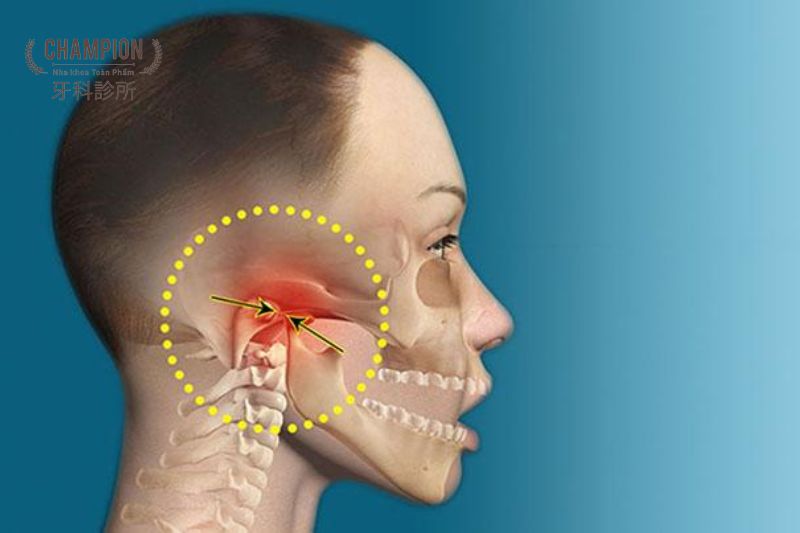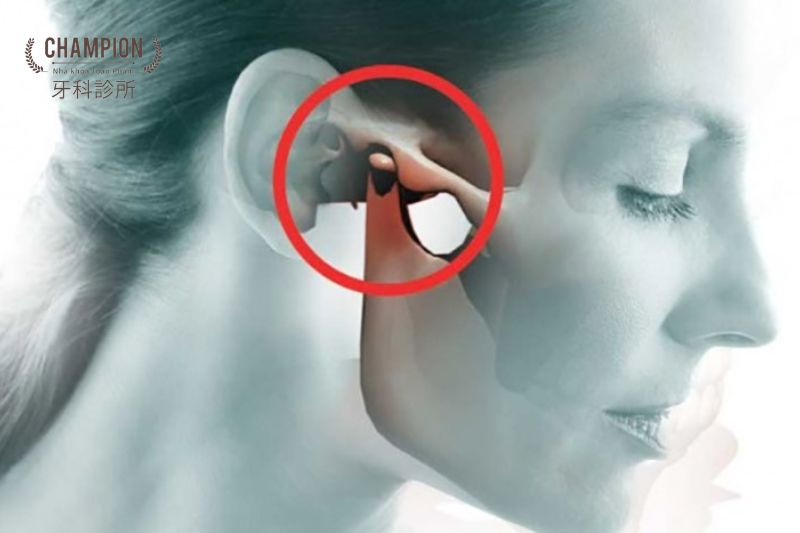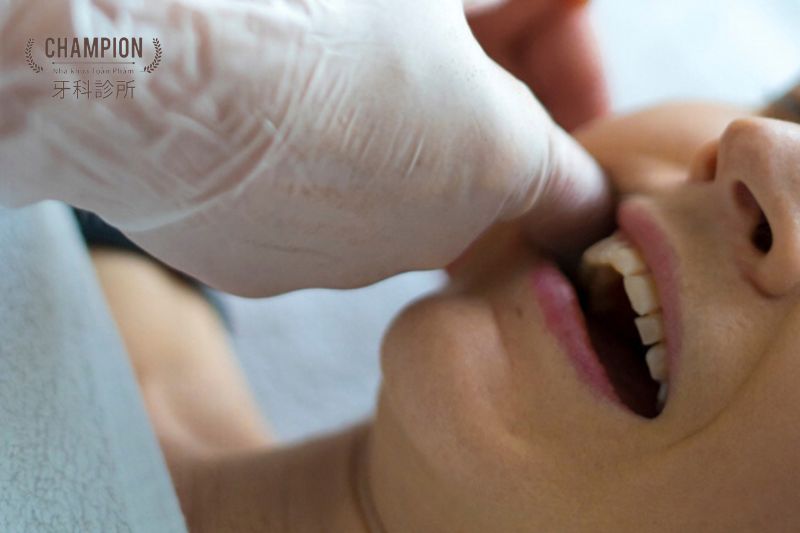Temporomandibular joint inflammation, also known as jaw joint inflammation, is a common medical issue related to the joints and surrounding structures of the jaw. This condition can cause various discomforting symptoms for those affected. The following article from Champion Dental Clinic will address some questions surrounding this condition and provide valuable information for individuals experiencing temporomandibular joint issues.
What is temporomandibular joint inflammation?
The temporomandibular joint is a crucial joint system located between the lower jawbone and the temporal bone. It is the only movable joint in the facial skeleton, playing a significant role in daily activities such as eating, speaking, and swallowing.
Temporomandibular joint inflammation, also known as TMJ inflammation, is a pathological disorder that affects the structure and function of this joint. The causes may include muscle tension, trauma, improper chewing habits, or even genetic factors. Symptoms of TMJ inflammation typically include pain, muscle spasms, joint imbalance, and a decrease in jaw opening and closing functionality.
This condition can affect individuals of all ages, but it is more common in post-pubescent females and menopausal women. The prevalence of TMJ inflammation in these groups is generally higher compared to males.

Common manifestations of temporomandibular joint inflammation
Initially, TMJ inflammation may start with mild pain on one or both sides of the face. Initially, the pain may subside without treatment. However, as the condition progresses, individuals may experience persistent pain, especially during eating and chewing.
Patients may find it challenging to open or close their mouths due to pain and muscle spasms in the temporomandibular joint area. Jaw movements become difficult and painful, reducing the ability to perform basic daily activities.
When opening the mouth or chewing, the temporomandibular joint may produce clicking sounds, indicating wear and tear within the joint. This clicking sound is often accompanied by pain and can further contribute to discomfort for the patient.
Additionally, individuals may feel compelled to shift their jaw to one side to alleviate pressure and jaw fatigue. This can lead to an imbalance in the bite, causing structural and facial symmetry issues.
Causes of Temporomandibular Joint Inflammation
Temporomandibular joint (TMJ) inflammation is a complex condition with multiple causes, and here are some key factors contributing to this disorder:
Joint Disorders
Diseases affecting the joints, such as joint degeneration, low-grade joint inflammation, and joint infections, are leading causes of temporomandibular joint inflammation. Among these, low-grade joint inflammation accounts for 50% of cases, especially prevalent in individuals with multiple degenerated joints due to aging.
Facial Trauma
Trauma to the facial region can result from accidents, falls during labor, or impact during sports activities. Severe impacts can damage the temporomandibular joint, leading to inflammatory conditions.
Incorrect Mouth Movements
Actions like sudden wide mouth opening, teeth grinding during sleep, or chewing gum excessively can exert significant and improperly directed pressure on the temporomandibular joint. This can cause damage and inflammation in the joint.
Misaligned or Dental Interventions
Misaligned teeth, crowding, or dental interventions such as tooth extraction or wisdom tooth removal can alter the facial structure, affecting the temporomandibular joint and creating conditions for inflammation.
Psychological and Stress Factors
Psychological factors such as stress, mental pressure, and emotional trauma also contribute to the risk of temporomandibular joint inflammation. Stress can intensify pain sensations and trigger inflammatory responses in muscles and joints.

>> See more: Causes, Symptoms, and Prevention of Jaw Pain
How is Temporomandibular Joint Inflammation Treated?
Temporomandibular joint inflammation requires comprehensive treatment based on the specific cause of the condition. Here are some common treatment methods applied in patient care.
Pain Relief Medications
In the treatment of temporomandibular joint inflammation, the use of pain relief medications is crucial to alleviate pain and inflammation. Nonsteroidal anti-inflammatory drugs (NSAIDs) like ibuprofen are often prescribed by doctors to reduce pain and inflammation in the temporomandibular joint area.
Physical Therapy
Physical therapy plays a significant role in the treatment process. Physical therapists guide patients through exercises to improve flexibility and strength of muscles around the temporomandibular joint. Methods such as infrared radiation, massage, and muscle manipulation can help reduce tension and pain.
Heat Therapy
Using heat therapy is a natural method to reduce tension and pain in the temporomandibular joint area. Additionally, gentle measures such as applying a cold compress to the painful area can effectively alleviate pain and discomfort.

Dental Treatment
In cases where the cause of temporomandibular joint inflammation is related to dental issues, corrective measures may be applied. Orthodontic treatments, tooth extraction, cosmetic dental procedures, bite correction, or even surgery on the jawbone structure may be treatment options depending on the patient's specific condition.
Patients with temporomandibular joint inflammation should take note of the following in their daily activities to support the treatment process and alleviate symptoms:
- Choose soft, easy-to-chew foods to reduce pressure on jaw muscles and prevent jaw misalignment.
- Limit prolonged chewing or only chew on one side to avoid jaw misalignment and additional pain.
- During painful episodes, patients can use heat packs or cold compresses to temporarily relieve pain.
- Allocate 10-15 minutes daily for self-massage and manipulation of the jaw area to reduce muscle tension, improve flexibility, and alleviate pain.
- Properly follow the prescribed dosage and instructions for medications to control pain and inflammation.
- If a plastic splint is recommended, patients should follow the instructions and usage procedures to avoid adverse effects on both sides of the jaw.
- Regular check-ups with the doctor to assess the status of the condition and monitor the side effects of medications are essential.
In conclusion, for patients who discover difficulties in jaw opening or closing, seeking immediate medical attention is crucial for timely intervention and prevention of serious complications. Prompt management helps halt the progression of the disease and improves the patient's quality of life. Contact Champion Dental Clinic promptly if experiencing the mentioned symptoms for timely treatment.
Vietnamese & English: (028) 5411-2295
中文: (028) 5411-2297 172 Nguyen Luong Bang, Tan Phu Ward, District 7, Ho Chi Minh City.
Fanpage: Champion Dental Clinic 牙科診所
Zalo: Champion Dental Clinic
Youtube: Champion Dental Clinic 牙科診所
 Champion Dental Clinic
Champion Dental Clinic



